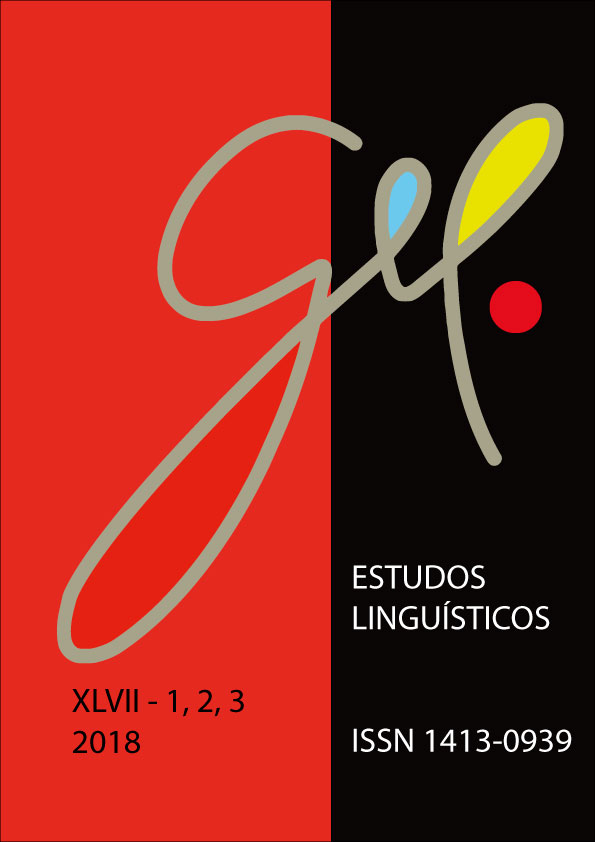Reference and stereotype in intercultural collaborative communication
DOI:
https://doi.org/10.21165/el.v47i2.1997Keywords:
teletandem, stereotype, national reference, mediationAbstract
Teletandem mediation aims at discussing, contextualizing linguistic and cultural issues from the interaction sessions. It is a suitable context for observing two movements: reference and stereotype (LIPPMANN, 2008). This paper focuses on the recurrent appearance of those movements in the mediators education in intercultural collaboration not to dichotomize the teaching of foreign languages but to watch its occurrence. We present two case studies of teletandem interactions in order to analyze and understand the recurrence mentioned through national identities, reference and stereotype. The results show that the national identities stand out to establish territorial belongings, to reveal greater knowledge of this interactant and understand the stereotypes as constitutive processes of nationality.Downloads
References
BACCEGA, M. A. Comunicação e Linguagem: discursos e ciência. São Paulo: Moderna, 1998.
BAUMAN, Z. Identidade: entrevista a Benedetto Vecchi. Tradução de Carlos Alberto Medeiros. Rio de Janeiro: Jorge Zahar, 2005.
BRAMMERTS, H.; CALVERT, M.; KLEPPIN, K. Aims and approaches in individual learner counselling. In: LEWIS, T.; WALKER, L. (Eds.). Autonomous Language Learning In-Tandem. Sheffield, UK: Academy Electronic Publications, 2013. p. 105-114.
BUTLER, J. Gender Trouble: Feminism and the Subversion of Identity. New York: Routledge, 1990.
BUTLER, J. Lenguaje, poder e identidad. Tradução de Javier Sáez y Beatriz Preciado. Madrid: Editora Síntesis, 2004.
CABECINHAS, R. Processos cognitivos, cultura e estereótipos sociais. In: ACTAS DO II CONGRESSO IBÉRICO DE CIÊNCIAS DA COMUNICAÇÃO, 2004, Universidade da Beira Interior, Covilhã. Disponível em: <http://hdl.handle.net/1822/1650>. Acesso em: 29 maio 2017. p. 3-18.
DERRIDA, J. Limited Inc. Campinas: Papirus, 1991.
ELHAJJI, M. Comunicação Intercultural: apontamentos analíticos. Revista Contemporânea, UERJ, n. 4, n. 1, p. 52-59, 2005.
GARCIA, D. N. M. O que os pares de Teletandem (não) negociam. São Paulo: UNESP, 2013.
GILHAN, B. Case Study Research Methods. London: Continuun, 2000.
HALL, S. A identidade cultural na pós-modernidade. Tradução de Tomaz Tadeu da Silva e Guacira Lopes Louro. 11. ed. Rio de Janeiro: DP&A, 2006.
LIPPMANN, W. Opinião pública. Petrópolis: Vozes, 2008.
MAZZARA, B. M. Estereotipos y prejuicios. Madrid: Acento Editorial, 1999.
PARISI, L. The Adventures of a Sex. In: Deleuze and Queer Theory. Edited by Chrysanthi Nigianni and Merl Storr. Edinburgh University Press, 2009. p. 72-91.
ROLNIK, S. Toxicômanos de identidade: subjetividade em tempo de globalização. Cultura e subjetividade: saberes nômades. Campinas: Papirus, 1997. p. 19-24.
SILVA, T. T. Identidade e diferença. A perspectiva dos Estudos Culturais. 13. ed. Petrópolis: Vozes, 2013.
TELLES, J. A. Teletandem and Performativity. Revista Brasileira de Linguística Aplicada, Belo Horizonte, v. 15, n. 1, p. 1-30, 2015.
TELLES, J. A. Teletandem: um contexto virtual, autônomo e colaborativo para aprendizagem de línguas estrangeiras no século XXI. Campinas: Pontes, 2009.
TELLES, J. A. Projeto Teletandem Brasil: Línguas Estrangeiras para Todos – Ensinando e Aprendendo línguas estrangeiras in-tandem via MSN Messenger. Faculdade de Ciências e Letras de Assis, UNESP. 2006. Disponível em: <http://www.teletandembrasil.org/site/docs/TELETANDEM_BRASIL_completo.pdf>. Acesso em: 02 jul. 2014.
VYGOTSKY, L. A formação social da mente: o desenvolvimento dos processos psicológicos superiores. Tradução de José Cipolla Neto, Luís Silveira Menna Barreto, Solange Castro Afeche. 7. ed. São Paulo: Martins Fontes, 2007.
WOODWARD, K. Identidade e diferença: uma introdução teórica e conceitual. In: SILVA, T. T. da (Org.). Identidade e Diferença: a perspectiva dos estudos culturais. Petrópolis: Vozes, 2013. p. 7-72.
ZAKIR, M. A. Cultura e(m) telecolaboração: uma análise de parcerias de teletandem institucional. 2015. 234 f. Tese (Doutorado em Estudos Linguísticos) – Instituto de Biociências, Letras e Ciências Exatas, Universidade Estadual Paulista, São José do Rio Preto, 2015.



